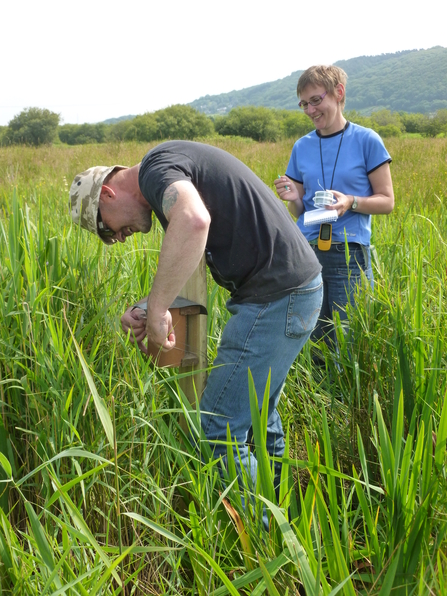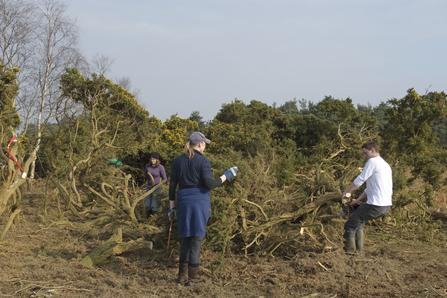New report links volunteering in nature with better mental health
The study was carried out by the University of Essex and found:
- 95% of participants who were identified as having poor levels of mental health at the start, reported an improvement in 6 weeks, which increased further over 12 weeks
- The mental wellbeing of more than two-thirds (69%) of all participants had improved after just 6 weeks.
- Improvements were greatest for people new to volunteering with The Wildlife Trusts and those who had poor levels of mental health at the start.
- Participants also reported significantly enhanced feelings of positivity, increased general health and pro-environmental behaviour, higher levels of physical activity and more contact with greenspace.
The study The Health and Wellbeing Impacts of Volunteering with The Wildlife Trusts was the third phase of scientific research carried out by the University of Essex on behalf of The Wildlife Trusts. It assessed changes in 139 participants’ attitudes, behaviour and mental wellbeing over the course of 12 weeks during which they took part in nature conservation volunteering activities. Most of the participants were attending projects because of a health or social need (they may have been suffering with a mental health problem or were cut off from other people resulting in loneliness and inactivity).
“Since I retired 7 years ago this project has been essential to my well-being – mental and physical.”

Lizzie Wilberforce
Dominic Higgins, Nature and Wellbeing Manager at The Wildlife Trusts says:
“The results of this structured research project make a powerful case for nature having a larger role in people’s every-day lives. The evidence is loud and clear – volunteering in wild places while being supported by Wildlife Trust staff has a clear impact on people’s health; it makes people feel better, happier and more connected to other people. Participants also reported increases in their sense of connection to nature. The Department of Health should take note – our findings could help reduce the current burden on the National Health Service because they illustrate a new model of caring for people that does not rely solely on medication and traditional services.”
While millions of people benefit from The Wildlife Trusts’ wild places and projects every year, we also work with over 40,000 active nature volunteers across the UK. The earlier, second, phase of Essex University’s research assessed the multitude of schemes being delivered across the Trusts and how wildlife-rich places improve mood, reduce social isolation and make a significant contribution to the nation’s health and wellbeing.
Quotes from Wildlife Trust volunteers who took part in the study:
- “I feel more connected to nature and my environment and have developed interests in this area.”
- “Since I retired 7 years ago this project has been essential to my well-being – mental and physical.”
- “I feel happier in myself.”
- “I have a greater appreciation for birds, bees, insects, plants and trees.”
- “Made me feel more content and happy about nature than I ever have.”
- “It’s restoring my faith in human nature.”
Dominic Higgins continues:
“Essex University’s research for The Wildlife Trusts over the last three years shows how positively people are affected by contact with the natural world and how being in wild places makes them happier. Everyone should be able to access wildlife-rich green places – achieving this requires a joined-up approach across government. Those responsible for public health, planning, transport, parks and leisure need to work together to make nature more accessible to people in their everyday lives.”

Chris Gomersall/2020VISION
Dr Mike Rogerson, University of Essex, says:
“Our findings across three phases of research have begun to evidence the wealth of health and wellbeing benefits provided through Wildlife Trust activities. The research revealed how volunteering with meaningful, nature and craft-focussed activities may be beneficial to both the general public and individuals with defined needs. More specifically, we found that attendance to Wildlife Trust projects was associated with improvements in a number of important health and wellbeing-related measures. At a time when we are losing count of local and national-level health, wellbeing, loneliness, community, and NHS burden crises, engagement with the Wildlife Trusts’ volunteering activities can provide a much-needed antidote for individuals, local areas and the UK as a whole.”
- A Summary of the Research: "Volunteering: A National Health Service." (http://www.wildlifetrusts.org/sites/default/files/summary_volunteering_-_a_natural_health_service.pdf)
- The Health & Wellbeing Impacts of Volunteering with The Wildlife Trusts (http://www.wildlifetrusts.org/sites/default/files/r3_the_health_and_wellbeing_impacts_of_volunteering_with_the_wildlife_trusts_-_university_of_essex_report_3.pdf)
The Wildlife Trusts commissioned the University of Essex to do three phases of research:
Phase 1 in 2015: Wellbeing benefits from natural environments rich in wildlife – A literature review.
This literature review, identified that there is a large body of evidence from published peer-reviewed papers and other literature to suggest that contact with a wide range of natural environments can provide benefits for health and wellbeing; such as reductions in stress and anxiety, increased positive mood, self-esteem and resilience, improvements in social functioning and in social inclusion. More specifically, it found that environments rich in wildlife are associated with improved wellbeing, through emotional, social and psychological outcomes. It cited a systematic review that found evidence that contact with biodiverse natural environments is associated with improvements spanning mental health outcomes and healthy behaviours.
Phase 2 in 2016: The direct and indirect contribution made by The Wildlife Trusts to the health and wellbeing of local people – an independent assessment. This report revealed that a sample of 17 out of the 47 Wildlife Trusts run more than 14,400 activities for the general public and 2,965 activities for vulnerable groups (individuals with defined needs) each year. Based upon evaluations previously undertaken by The Wildlife Trusts, Phase 2 identified that Wildlife Trust activities facilitated each of the five evidenced-based ways to improve your wellbeing: participating members of the general public developed skills, improved their perceived and actual health and increased their physical activity; attendees from vulnerable groups - people experiencing social disadvantage, people with mental ill health and the unemployed - reported improvements in confidence, self-esteem and mood and the ability to manage medication more effectively.
Phase 3 - published October 2017: The health and wellbeing impacts of volunteering with The Wildlife Trusts – a scientific evaluation of the health and wellbeing impacts of Wildlife Trusts’ volunteering programmes. The Wildlife Trusts decided to adopt a health and wellbeing evaluation tool and a systematic approach that allows individual Wildlife Trusts to collect, share and pool health and wellbeing evidence. Indeed, it is important to directly examine the wellbeing-related
impacts of attendance at Wildlife Trust projects, so to better understand and begin to build an evidence base for these; such evidence and understanding might then be disseminated and used positively within health contexts both for the general public and for specific vulnerable groups. The purpose of Phase 3 was to carry out an independent, academic evaluation of the extent of health and wellbeing benefits of taking part in a sample of activities run by individual Wildlife Trusts, with two linked aims:
1. To measure direct physical health and mental wellbeing effects on participants involved with a Wildlife Trust initiative or project, in a robust scientific way.
2. To develop and pilot a simple, meaningful methodology which The Wildlife Trusts could scale up to use across the movement to gather both longitudinal and UK–wide data in the future.
